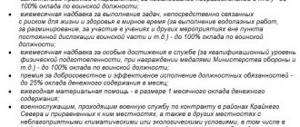Free legal consultation by phone:
8
Passing a medical examination is the direct responsibility of every employee and must be strictly monitored by the employer. Failure to undergo a medical examination is considered a clear violation and will entail big problems for both the employee and the organization as a whole. A person undergoes a medical examination primarily for the purpose of prevention and identification of diseases that may interfere with work activity. The illness of an employee will affect his work, which will subsequently affect the overall productivity and efficiency of the organization.
For refusal to undergo a medical examination, the employer has every right to remove the employee from his position until (or, in certain cases, even impose a disciplinary sanction on the basis of Article 192 of the Labor Code of the Russian Federation) until he undergoes a mandatory examination and presents official medical documents.
The employer's obligation to organize medical examinations of employees
Current legislation contains an obligation for employers to conduct medical examinations of their employees.
In this case, payment for these procedures must be carried out by the organization from its own funds. This rule applies to primary, periodic, and extraordinary medical examinations.
For the period while the employee is unable to perform his duties due to being examined by doctors, his job is retained and payment is made from his average earnings.
A preliminary examination is carried out for persons who are just applying for a job. Employees for whose workplaces this is established by the carried out special assessment system or by the norms of current legislation must undergo periodic testing.
An extraordinary medical examination can be carried out in a situation where, due to the current state of health, the employee cannot cope with the duties assigned to him. Indications for this medical examination are also defined at the legislative level.
Labor legislation establishes an obligation for an employee to undergo a medical examination in certain situations.
If an employer ignores the requirements of the law and does not conduct inspections for its employees, it may be subject to administrative liability.
What do pre-trip inspection experts say?
Let's turn to the specialists. The company Garant (Legal Consulting) believes that the law on the need to have a waybill applies not only to persons driving transport owned by a legal entity. Experts conclude: when personal transport is used for business purposes, it is necessary to issue a license. This need arises regardless of whether the obligation to drive a car is specified in the employment contract or not; whether the organization provides services for the transportation of goods, passengers, luggage or not; whether there is a driver position on staff or not. When carrying out a business trip, the driver or a person acting as such is subject to the law 2.1.1 of the Traffic Regulations.
Note: The concept of “directly provided” includes cases when: the vehicle is driven by a hired driver-carrier;
- transport oversized or dangerous cargo (medical control must be carried out daily);
- the car belongs to a legal entity or individual entrepreneur;
- transportation of people (passengers) is carried out.
This law applies to drivers driving vehicles registered to a legal entity, carriers of dangerous, oversized cargo, passengers or luggage.
If the accusation is based on Federal Law No. 196, Art. 2 (dated November 15, 1995), and any person behind the wheel is considered a driver, the decision will be unambiguous. How it happened in the Omsk Regional Court dated February 9, 2016, case No. 77-80/2016. In order to avoid fines, and not count on luck, it is necessary not only to issue waybills, but also to organize (conclude an agreement with a licensed medical institution) a pre-trip medical examination for persons acting as a driver, regardless of the vehicle in which he travels on duty, who is registered in the company, how fuel and lubricants are recorded, how this is reflected in tax deductions. Judicial practice If an employee is not registered as a driver, but is forced to perform his duties - driving a car for official purposes, a controversial situation arises. Judicial practice is ambiguous: the guardians of the law also have opposing opinions. In case No. A32-7034/2011 (dated December 28), Resolution No. 15AP-12568/2011 (15th Arbitration Court of Appeal), a decision was made on the need to organize pre-trip medical examinations for persons who are not drivers on staff, but who drive company vehicles on official purposes. The need to comply with the requirements of the Federal Law on road safety was also stated by the 6th Arbitration Court (case No. A37-2345/2012 dated June 6, 13), Resolution No. 06AP-5556/2012. The decision made states: having a vehicle on its balance sheet, the organization is obliged to ensure that it undergoes pre-trip medical examinations (technical inspection), as provided by law. The employer is responsible for the organization, and he also bears the financial costs.
7. Pre-shift, post-trip and post-shift post-trip medical examinations are carried out at the expense of the employer
8. Pre-shift, pre-trip, post-shift, post-trip medical examinations are carried out by medical workers with and (or) secondary vocational education, a medical organization or an organization carrying out medical activities (including a medical worker who is on the staff of the employer if there is a license to carry out medical activities
) providing for the performance of work (services) for medical examinations (pre-trip, post-trip, pre-shift, post-shift).
9. Organization of mandatory pre-shift, pre-trip and post-shift, post-trip medical examinations is the responsibility of the employer
.
The manager must ensure that travel documents are prepared with all the required details, which include a medical examination. It does not matter who the employee is on the company's staff.
Any person driving a vehicle is a driver. On this basis, the legal entity operating motor vehicles has the obligation to organize pre-trip inspections of drivers. A passenger car driven by a CEO is no exception.
The judge in case No. A70-1916/2014, Resolution No. 08AP-5835/2014 (08/12/2014) looks at similar circumstances differently. Based on the first paragraphs of articles: 20 and 23 of the Federal Law “Road Traffic Safety Inspectorate” No. 196, he concluded that that the law applies only to persons enrolled as drivers in the company's staff engaged in the transportation of cargo, passengers or luggage. Persons driving vehicles owned by a legal entity, but listed under an employment contract in a different capacity, not as drivers, do not need to undergo pre-trip medical examinations, although waybills must be issued.
According to this decision, the employee is required to have a voucher (it is issued on the vehicle), but the director of the company is not required to see a doctor. Thus, the request of the State Traffic Safety Inspectorate was denied, which ordered the LLC to organize for persons driving a vehicle on the company’s balance sheet a pre-trip medical examination and filling out travel documents with all the required attributes.
Despite such decisions, the head of labor disputes, D.V. Eliseenko, recommends that organizations that have vehicles on their balance sheets that are driven by employees who are not drivers, organize pre-trip medical examinations. The tendency of legal proceedings is such that such cases are considered more in favor of regulatory organizations, and a driver, according to the DD Rules, is any person who drives transport, and it does not matter what position the employee holds.
In April, in case No. 21-736/2016 of Khabarovsk, an appeal was denied to official E.M. Stolyarov. The driver did not have a pre-trip medical examination stamp on his waybill. The person responsible for organizing the inspections was subjected to an administrative fine of 30 thousand. rubles under Article 12.31.1 Part 2 of the Administrative Code.
Organizations are required, regardless of the type of activity, to organize at the enterprise (conclude an agreement with a licensed medical institution) a pre-trip examination of persons performing the duties of a driver. When using company transport for business trips, you must issue a waybill. The document provides for the presence of mandatory details, which include the doctor’s stamp.
Pay attention to the Resolution of the Armed Forces of the Russian Federation dated December 19, 2016 No. 18-AD16-173. Sales representatives traveling around the customer base along the route specified in the waybill, on the same basis, must undergo a pre-trip medical examination. The employer is responsible for organizing and paying for it. The sales representative's job description specifies the driver's responsibilities; he undergoes regular training; the car must be presented to a mechanic for inspection, using a permit, and it must have a doctor's stamp on it.
Conclusion: From the above, we come to the conclusion that despite the ambiguity of court decisions, there is a steady increase in decisions where the law supports the requirements of regulatory authorities. Drivers who are required to undergo a pre-trip inspection include those who are required to travel with a waybill. Lawyers, jurists, and experts agree on one thing - where transport is operated for commercial or official purposes, it is necessary to organize a pre-trip medical examination.
Who is required to undergo a medical examination?
The list of persons for whom medical examinations are mandatory is defined by law:
- If the employee is not yet 18 years old;
- If, based on the results of the special assessment and assessment process, it is determined that the employee’s place of work is exposed to harmful and dangerous factors;
- Workers who are involved in the food industry, catering establishments, and direct sales of goods to consumers;
- Workers who work on a rotational basis;
- Workers who perform their work duties underground;
- Employees who perform duties in the Far North or equivalent territories;
- Private security officers;
- Professional athletes;
- Education workers;
- Workers who manage transport.
Current legislation may expand the list of these persons.
Timing and frequency of its passage
A medical examination of an employee is a procedure based on the results of which occupational diseases are identified and the risk of their acquisition and development is prevented. It is carried out only in medical institutions.
Each profession has its own frequency of examination by doctors.
The following types of medical examinations are distinguished:
- Preliminary - carried out when hiring an employee to the enterprise;
- Periodic - must be carried out after a certain period of time on the basis of the provisions of the law, SOUT and other acts. Each profession has its own interval for undergoing this type of examination, but usually it ranges from one to four times during the year. For example, employees in the catering industry must undergo a medical examination once a year; the same frequency is established for those workers whose workplace is located underground. At the same time, employees who care for elderly and young children must undergo a medical examination 4 times a year.
- Pre-trip and post-trip inspections are carried out by transport workers. This frequency is set this way because not only their lives and health, but also those of the people around them depend on these workers. Therefore, they are required to undergo inspection before and after their shift every working day.
- Extraordinary - must be carried out at the request of the employee or employer.
Attention! Thus, frequency represents the period after which the employee must be sent for inspection again.
Grounds for dismissal of an employee who has not passed a medical examination
Company management may suspend an employee from work if he does not pass a medical examination.
When he continues to refuse this examination, it is possible to formalize the termination of the employment contract on the basis of clause 5 of part 1 of Art. 81 of the Labor Code of the Russian Federation, which presupposes this punishment for repeated failure by this person to fulfill his labor duties.
However, when the commission recognizes an employee as unsuitable for a given job, and the employer is unable to transfer him to an easier job, the company can also terminate the employment contract on the basis of clause 8 of part 1 of Art. 77 of the Labor Code of the Russian Federation, which implies dismissal for refusal to transfer to another job for medical reasons.
General procedure for removing an employee from work without a medical examination
When an employee has not fulfilled the requirements for passing a medical examination, he cannot be allowed to work. The employer has the right to remove him, but it is important to adhere to a certain procedure, namely:
- A document is drawn up certifying that the employee has not undergone a medical examination.
- The manager issues an order of removal, after which the document is registered in the personnel department.
- The employee gets acquainted with the order in the prescribed manner.
- After the employee undergoes a medical examination, an order for his admission is issued and is also registered. The employee becomes familiar with the contents of the document.
It turns out that in order to fulfill the conditions prescribed in the Labor Code of the Russian Federation, the employee is required to undergo a medical examination, and the employer has the right to remove him from official duties without a medical examination. If the employee refuses to undergo the procedure, then these days will not be counted. The period spent on the examination is fully compensated in monetary terms.
What should an employee who has not passed a medical examination do?
The administration, when deciding what to do if a company employee has not passed a medical examination at work, must take into account two options for what happened.
The company employee did not show up for the medical examination
The employee must be warned of the need to undergo a medical examination. This is best done in the form of a written notice that includes all the information needed for the medical examination.
If this employee never came to the medical institution for examination, then you must immediately draw up a report of this person’s failure to appear. Next, you need to request an explanation from him regarding this fact.
If the employee had good reasons for this, confirmed by relevant documents, he will need to undergo an examination at the first opportunity.
If he is unable to do this or refuses again, then this offense is considered disciplinary, and the employee will be held accountable accordingly - a reprimand, reprimand, etc.
It is also important to understand that management has the right to remove this employee from work without pay for these days.
Which employees are required by law to undergo a medical examination?
In the Labor Code of the Russian Federation, namely in Art. 266 and art. 348-3 stipulates who must undergo preliminary and mandatory medical examinations.
The following categories of workers are subject to mandatory inspection:
- workers in the food and light industry;
- preschool and school educational organizations;
- catering workers, etc.
By the way, situations in which an order for suspension from work due to alcohol intoxication is required are described in another article.
How much time is required according to the Labor Code of the Russian Federation for undergoing a medical examination?
The law does not establish a specific period for undergoing a medical examination. The timing depends on the agreement with the medical center. The contract is considered binding for those undergoing inspection. Exceeding the deadlines will be considered a violation of the law, according to Art. 192 and art. 193 Labor Code of the Russian Federation.










